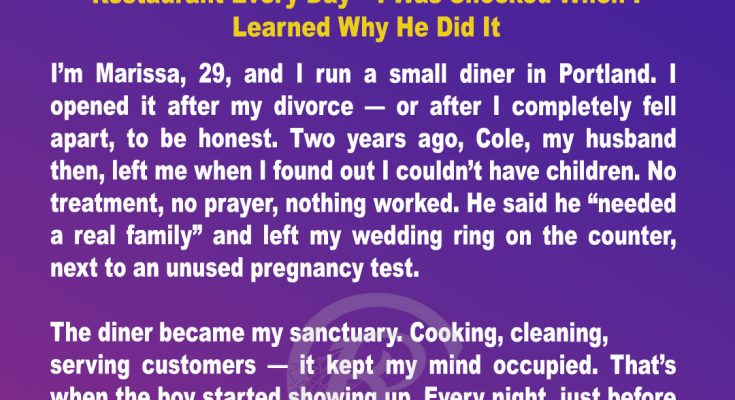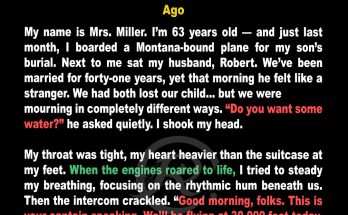People come and go in a diner, and most of the time, they leave nothing behind but crumbs and crumpled napkins. But every so often, someone walks in and quietly rearranges everything you thought you knew about yourself.
I never imagined I’d cry in the back alley of my own restaurant. Not after everything I’d already survived.
But that’s exactly what happened the night I followed a little boy, no older than ten, who had been quietly picking up our leftovers for weeks.
My name is Marissa. I’m 29 years old, and I own a small diner tucked between a tattoo parlor and a thrift shop on the east side of Portland. It’s called Marlo’s, a name I stitched together from mine and my late grandmother’s. She was the one who taught me how to cook scrambled eggs before I could even write my name, back when things were still simple.
I opened the diner two years ago, just months after my life cracked wide open.
My husband, now my ex, Cole, who is 31, walked out on me the same week I got my diagnosis. I’ll never forget that day. The doctor’s office was quiet, almost too clean. When she told me I was infertile, it felt like all the sound in the room disappeared. I just sat there, blinking at her lips, not really hearing the words anymore.
Cole and I had been trying for a baby for almost three years. IVF, adoption applications, holistic routes, even anointing oils and late-night prayers whispered into pillows. Every single door closed on us.
One morning, he came down the stairs with a duffel bag in his hand. No warning. No fight. Just… silence.
He left his wedding ring on the counter, right next to an unopened pregnancy test I’d bought in a stupid burst of hope.
“I needed a real family, Marissa. But it seems I can never have that with you,” he said. Not angry. Just tired.
Then he left. And that was it.
I stopped trying to make sense of things after that. Some people fall apart and stay there. I decided if I was going to break, I’d break forward.
The diner saved me. Or maybe I saved myself through the diner. I started waking up at 5 a.m., pouring coffee before sunrise, flipping pancakes while pretending my life hadn’t imploded. I built something with my own hands, even if I’d lost something I could never get back.
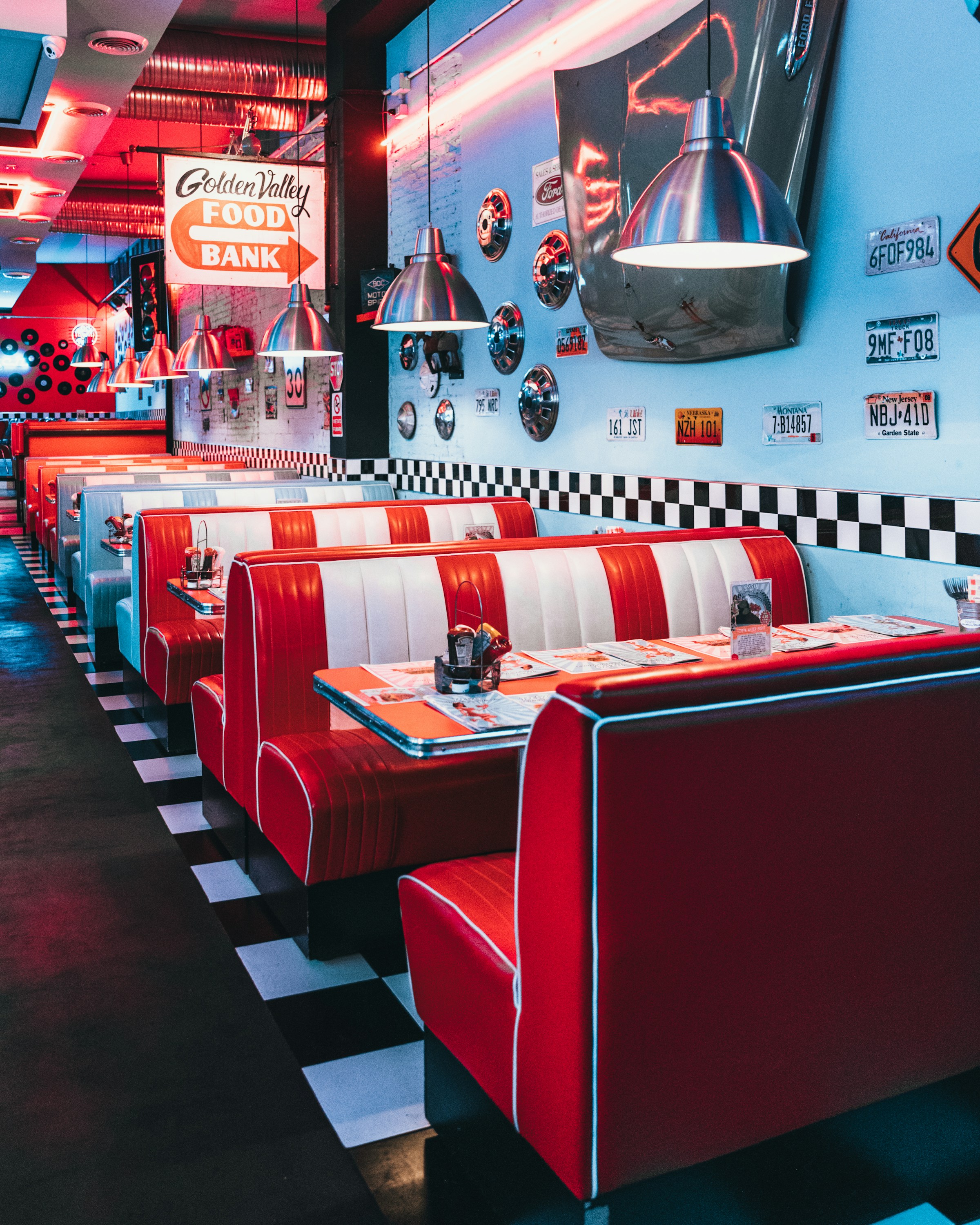
The interior of a diner | Source: Unsplash
Then one day, this kid showed up.
It was maybe five minutes before closing. The place was almost empty except for an old guy nursing a black coffee by the window.
I heard the bell above the door and looked up. A skinny boy walked in, probably around ten, with dark brown hair that flopped over his eyes. He wore a red hoodie that was two sizes too big and clutched the straps of a tattered backpack like it held something precious.
He stood just inside the door, eyes scanning the room as if he were making sure no one noticed him.
Then, he walked up to the counter.
“Ma’am,” he said politely, his voice barely above a whisper, “do you have any leftovers today?”
I blinked.

A surprised woman | Source: Unsplash
“Leftovers?” I asked, surprised. “What kind?”
“Anything,” he said quickly. “I’m not picky.”
I stared at him for a second, trying to read his face. He wasn’t begging. He wasn’t even making eye contact. It was like he’d practiced this.
“Hang on,” I said and went back to the kitchen. I grabbed a box of pasta Alfredo we hadn’t sold, wrapped a slice of garlic bread in foil, and tossed in a cookie from the day’s batch.
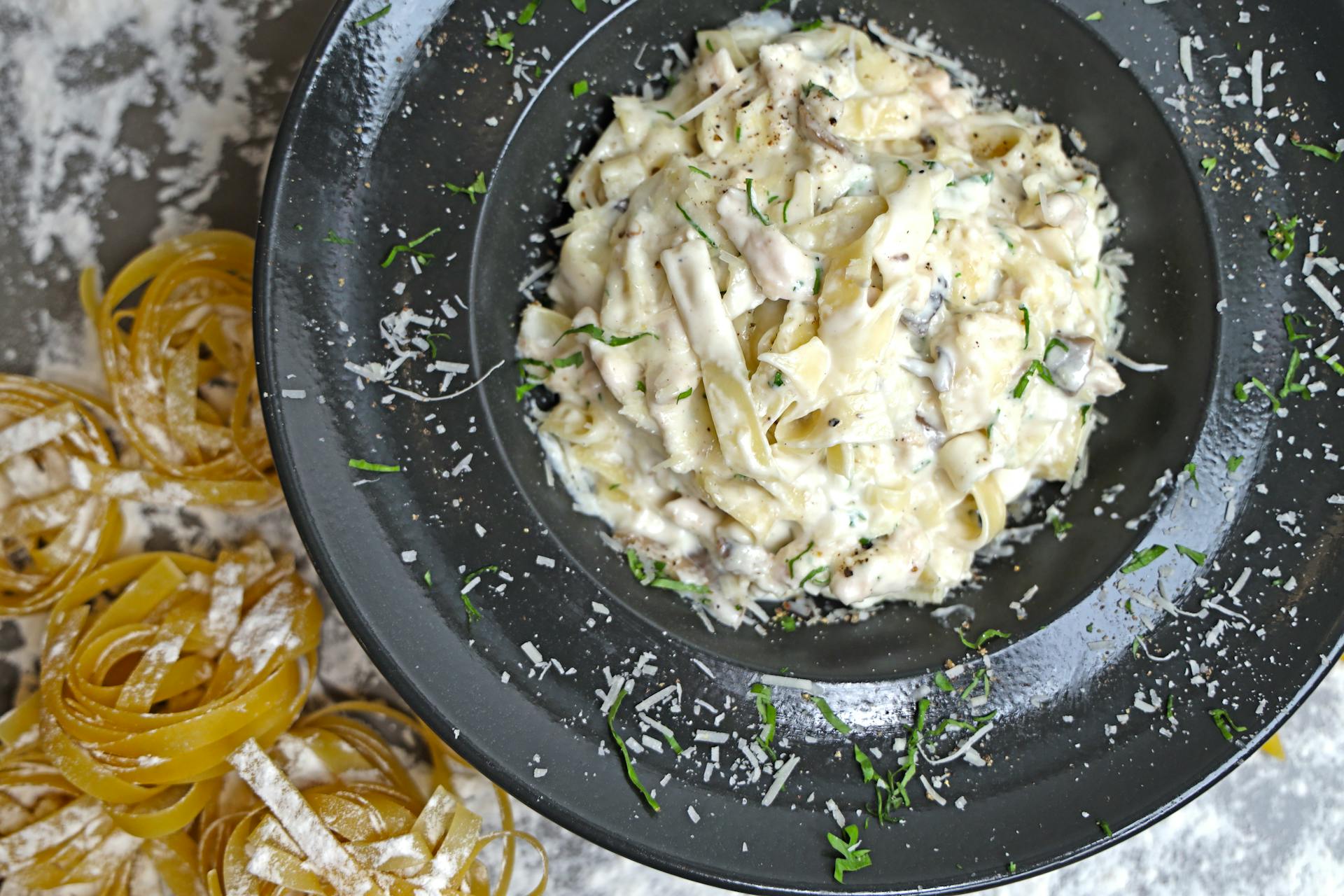
A bowl of pasta with chicken and cheese on top | Source: Pexels
When I handed him the bag, he gave a quick nod.
“Thank you,” he said, eyes still averted. “Really.”
And just like that, he ran out.
That became our new normal. Every evening around closing time, the boy would show up. He was always polite and always alone. I made sure we had something ready for him, whether it was burgers, spaghetti, grilled cheese, or whatever hadn’t sold. He never lingered or sat down. He just took the food, mumbled a thank-you, and disappeared.
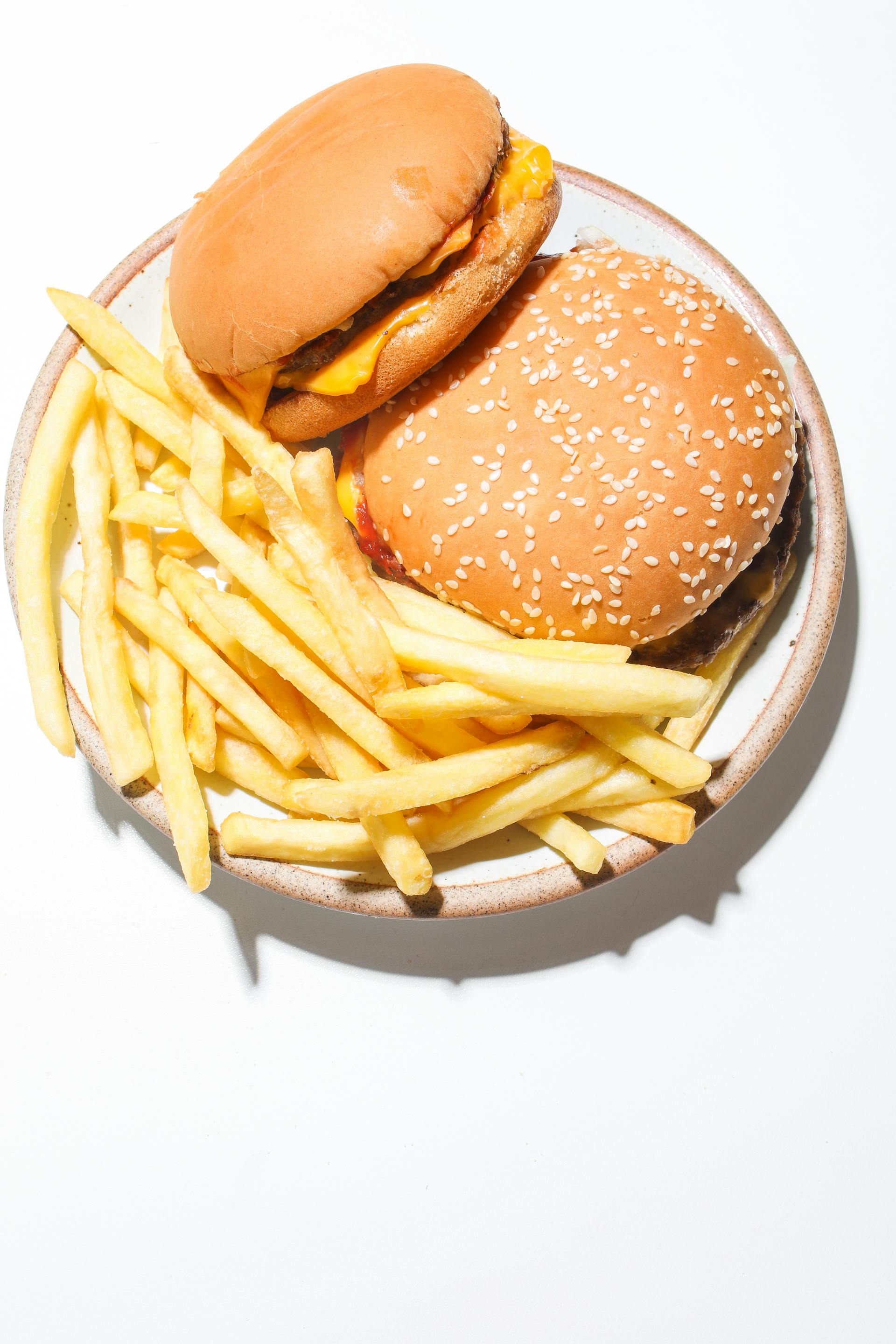
Burgers and fries served on a plate | Source: Pexels
I started to wonder. Maybe he was homeless? But something didn’t add up.
His hoodie was worn but clean. His jeans had patches, but they didn’t hang off him like street clothes. His sneakers were too big, but the soles weren’t falling apart. And he never looked hungry enough to be starving. He never ate in front of me. He always carried the food as though it were for someone else.
That thought kept gnawing at me.
Who was he feeding?
One rainy Tuesday night, my curiosity got the better of me. I told my staff to close up, grabbed my coat, and waited at the kitchen window until I saw him come in.
He looked even smaller, soaked in rain, water dripping from his hair onto his shoulders. I handed him a container of mac and cheese and a bag of mini cornbread muffins.
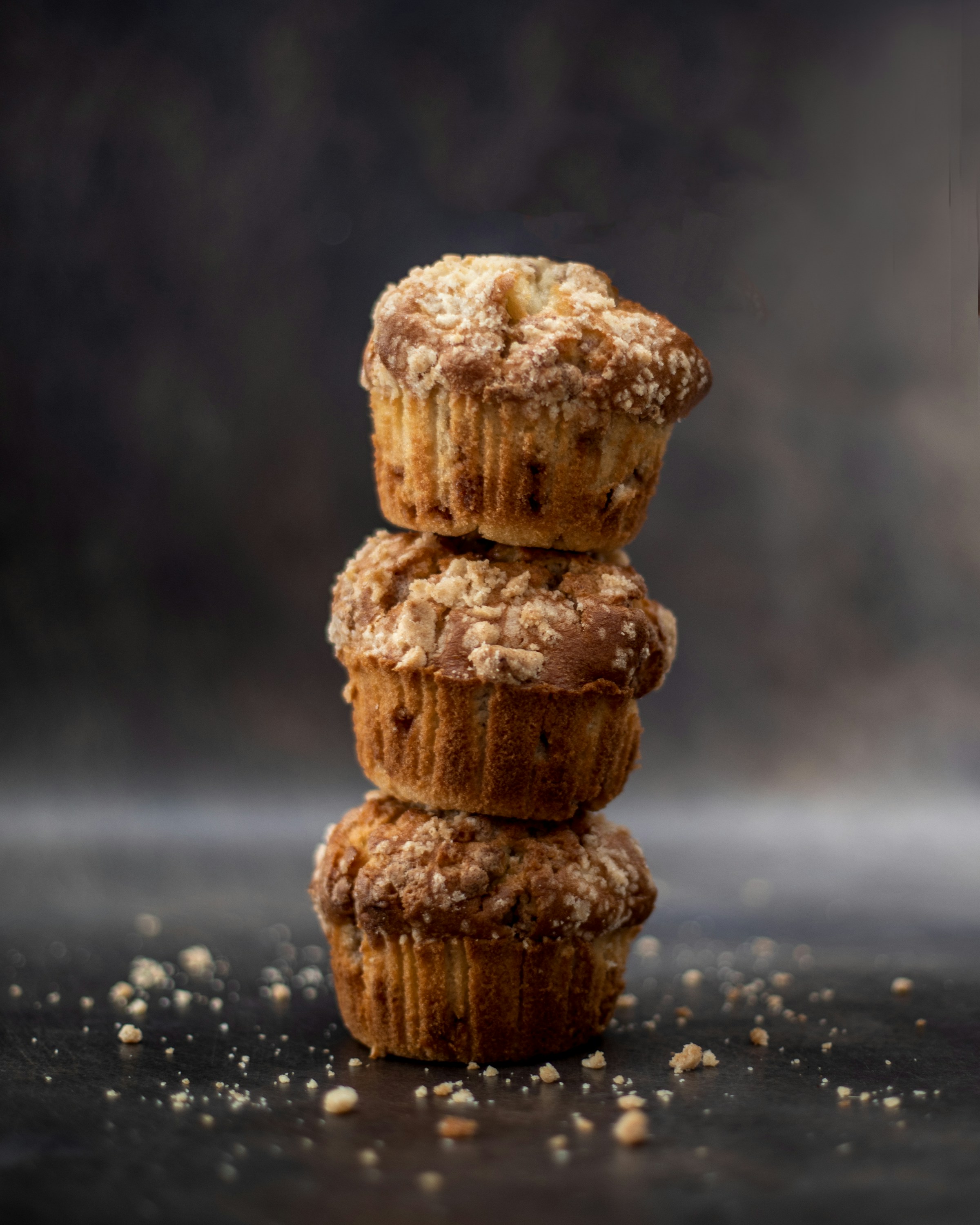
A stack of three muffins sitting on top of a table | Source: Unsplash
He gave his usual thank-you and bolted out the door.
This time, I followed.
I kept a few yards behind, staying in the shadows. He walked fast, cutting through back alleys and slipping between buildings like he knew every shortcut in town. I almost lost him at the gas station on the 6th when he darted across the street without looking.
Then he stopped in front of a small duplex on a dimly lit block. The building looked as if it had seen better days. Paint peeling, one window boarded up, and a front porch that sagged under its own weight.
He crept up the steps, placed the food on the porch, knocked twice, and ran back down the steps like the ground was on fire.
I ducked behind a parked car.
A few seconds passed. Then a light flickered on inside.
The door creaked open, and an elderly woman stepped out. She looked frail, maybe in her 70s, dressed in a faded housecoat and slippers. Her hands trembled as she picked up the bag and looked around.
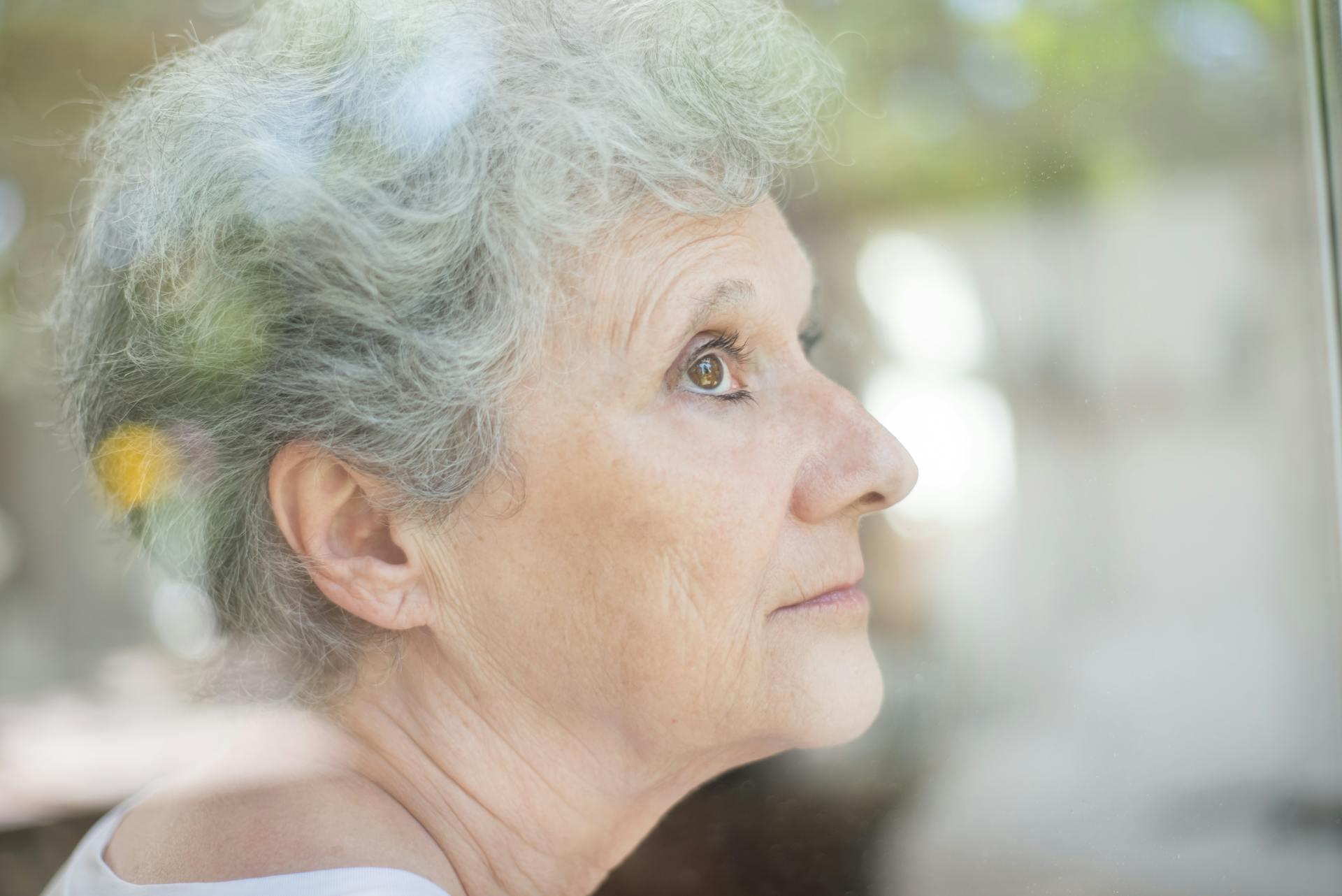
Close-up shot of an elderly woman | Source: Pexels
When she stepped back inside, I felt something inside me twist. A lump rose in my throat so fast I couldn’t breathe. I leaned against the car, tears burning behind my eyes.
This boy wasn’t feeding himself.
He was feeding her.
The next evening, I didn’t hide. I waited by the counter, watching the door.
Sure enough, right before closing, he came in.
His hair was damp again, cheeks red from the cold.
I handed him a bag with chicken soup and bread rolls, along with a small chocolate cupcake I had made that morning.
As he reached for the bag, I placed my hand gently on the counter.
“Hey, kid,” I said softly. “You don’t have to lie to me.”
He froze.
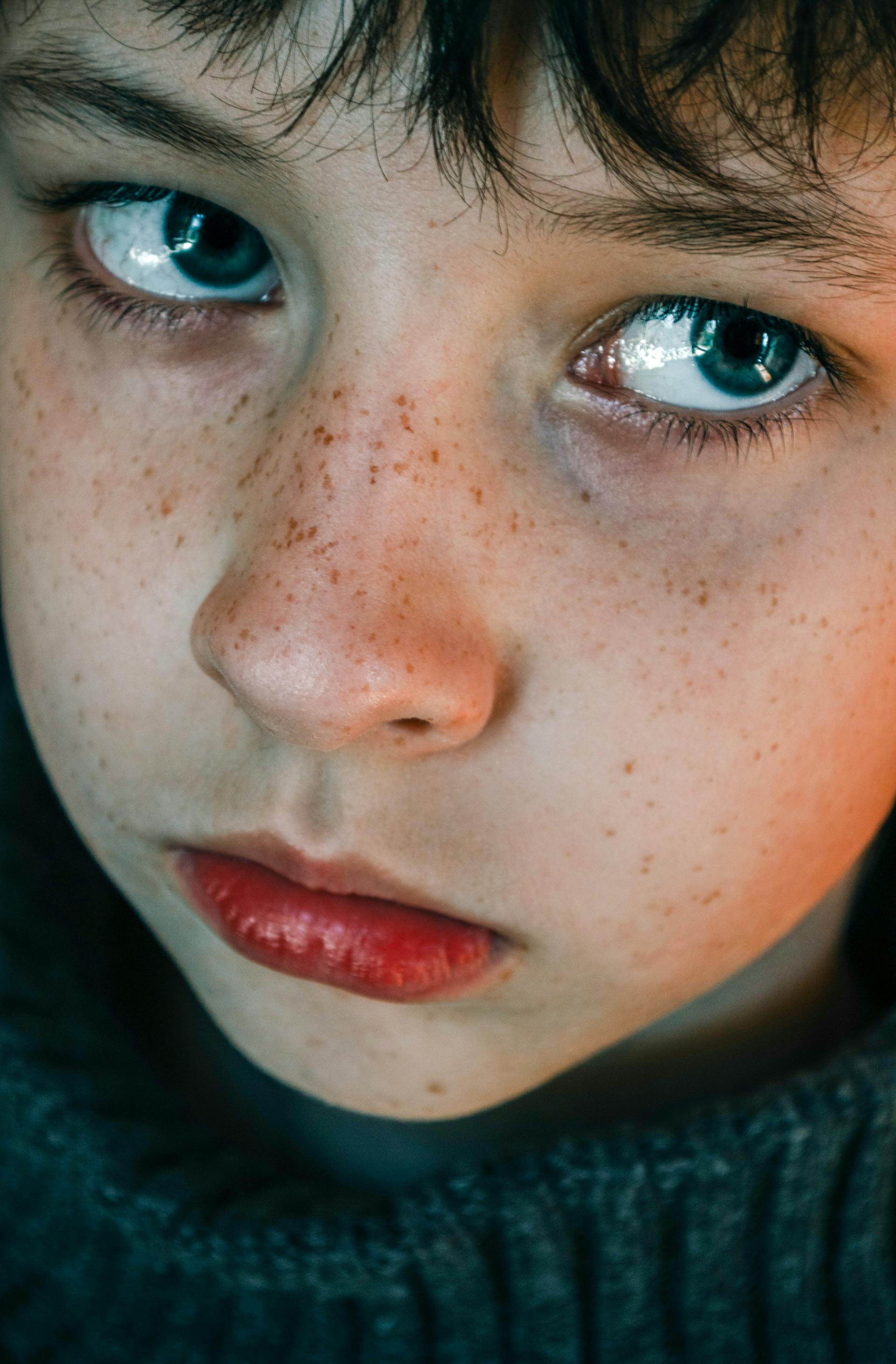
A close-up of a boy’s face | Source: Pexels
I leaned in a little.
“Who’s the food for?”
His small hand gripped the edge of the counter, and for a second, I thought he might run again. But then his bottom lip trembled, and he looked up at me with wide, unsure eyes.
“It’s for my grandma,” he whispered. “She’s sick. They took me to a foster home after my parents died, but she’s all alone. So I sneak out every night to bring her food.”
I stood there stunned. My chest tightened in a way I hadn’t felt in years.
“Wait… You sneaked out? Every night?” I asked gently.
He nodded, glancing toward the door as if he wasn’t sure if this conversation was safe.
“I have to be back before they check rooms,” he said. “They’d be mad if they knew.”
My heart cracked right down the middle.
“Does she know it’s you?” I asked softly.
He shook his head, his eyes dropping to the floor.
“No. The foster family doesn’t let me visit her. They said she’s too poor to take care of me. I just want to make sure she eats. That’s all.”
His voice wavered, and for a moment, we both stood there in silence. I couldn’t find the right words. I just reached over and gently placed the food bag in his hands.
“Be safe, okay?”
He nodded and whispered, “Thank you,” and slipped back out into the night.
But I couldn’t sleep.
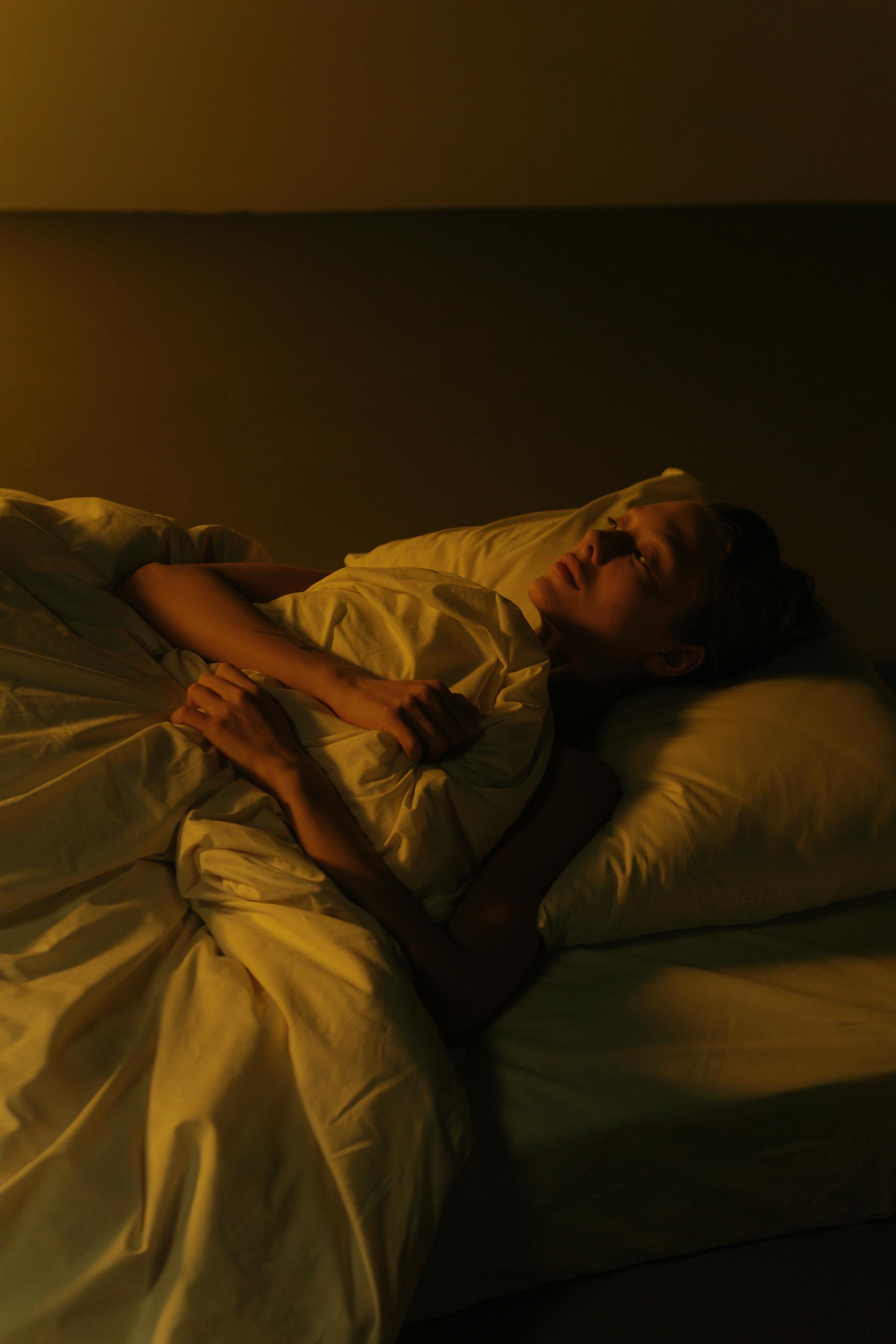
A woman lying awake in bed at night | Source: Pexels
All I could think about was his thin frame running through wet streets, holding onto food he never even tasted. The image of him knocking and running off into the darkness haunted me.
So the next day, I closed up the diner early and walked to the duplex.
It was even more run-down up close. The steps creaked under my weight, and I knocked twice before the door creaked open. A frail woman stood there, her white hair pulled back into a loose bun, dressed in a threadbare cardigan.
“Hi,” I said softly. “I’m Marissa. I own the diner at 8th and Green. I think… I think your grandson has been bringing you food from my place.”
Her eyes widened, and her hand went to her chest.
“My grandson?” she said, her voice breaking. “You mean Owen?”
I nodded.
Her lips trembled. She stepped back and leaned against the doorframe like she needed help to stay upright.
“I thought I was dreaming,” she whispered. “Every night I’d find food on the porch. I thought… I prayed to my husband in heaven, thinking maybe he was watching over me.”

Close-up shot of an elderly couple having dinner | Source: Pexels
Tears filled her eyes. She turned and waved me inside.
“I’m Ruth,” she said. “Please come in.”
The living room was dim, with faded wallpaper and mismatched furniture, but it was clean. Pictures of a young boy, clearly Owen, lined the mantle.
As we sat down, I gently told her everything I knew. I explained how Owen had been coming to my diner, asking for leftovers, always polite, never taking anything for himself.
When I told her that he’d been sneaking out every night to bring her meals, she broke down crying.
“Oh, that sweet boy,” she said, covering her mouth. “After my daughter and son-in-law died in a car crash, they wouldn’t let me see him. Said I wasn’t fit to raise him. They didn’t care that he’s all I have left.”
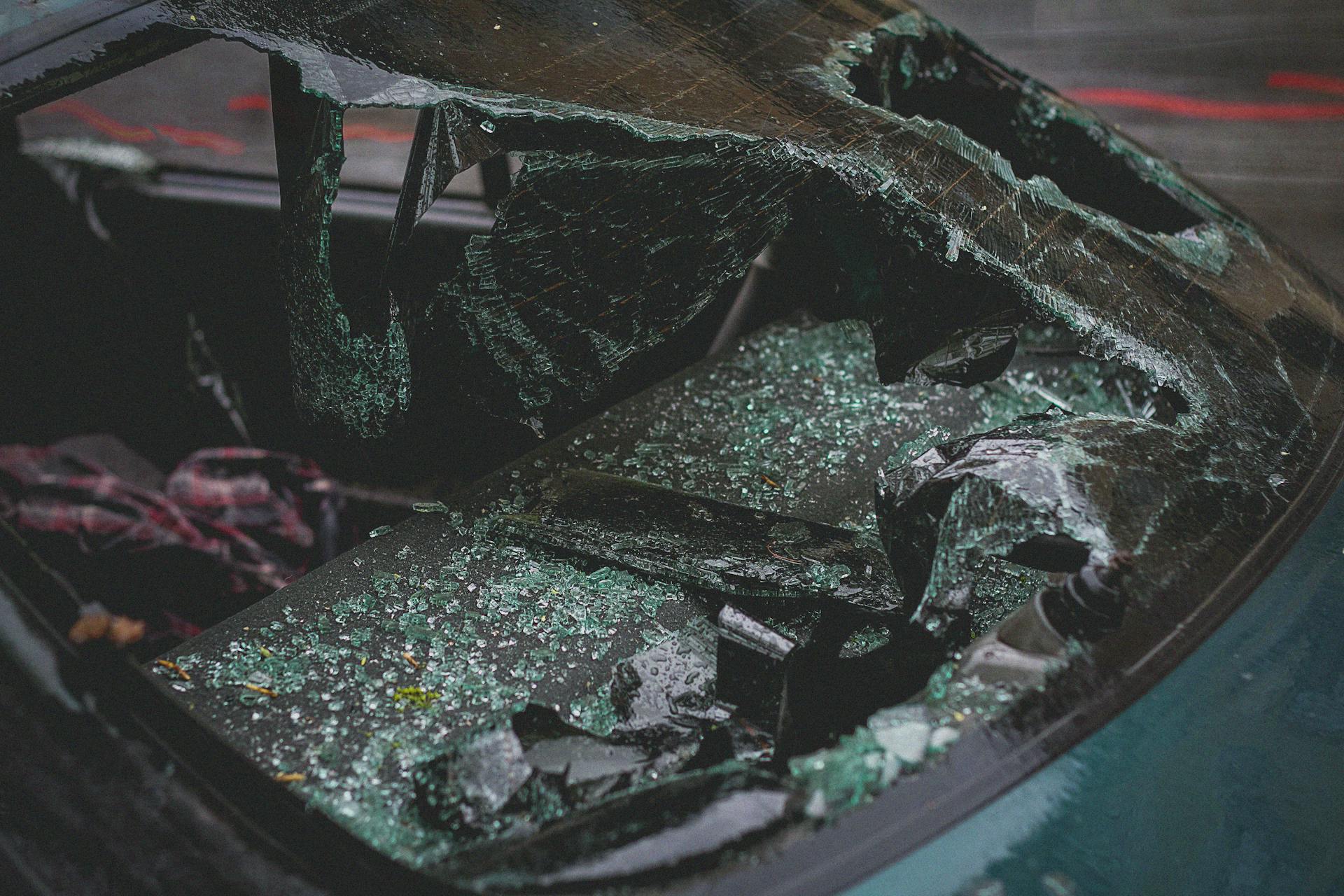
The broken windshield of a car | Source: Pexels
I sat beside her and held her hand. We cried together for a long time.
That week, I started bringing food to Ruth myself. Sometimes it was just soup and bread, and other times full dinners. She always tried to offer me something in return, like a cup of tea or a piece of candy from an old dish on the shelf, and she would tell me stories about Owen’s childhood.
“He used to draw pictures of me all the time,” she said one evening, showing me a shoebox full of crayon drawings. “In every one of them, I’m smiling. Even when I wasn’t.”
Owen found out I’d talked to her the following week. He came into the diner as usual, but this time his face was stiff, cautious.
“You told her?” he asked quietly, standing just inside the kitchen door.
I nodded, setting down a plate of pancakes I’d made just for him.
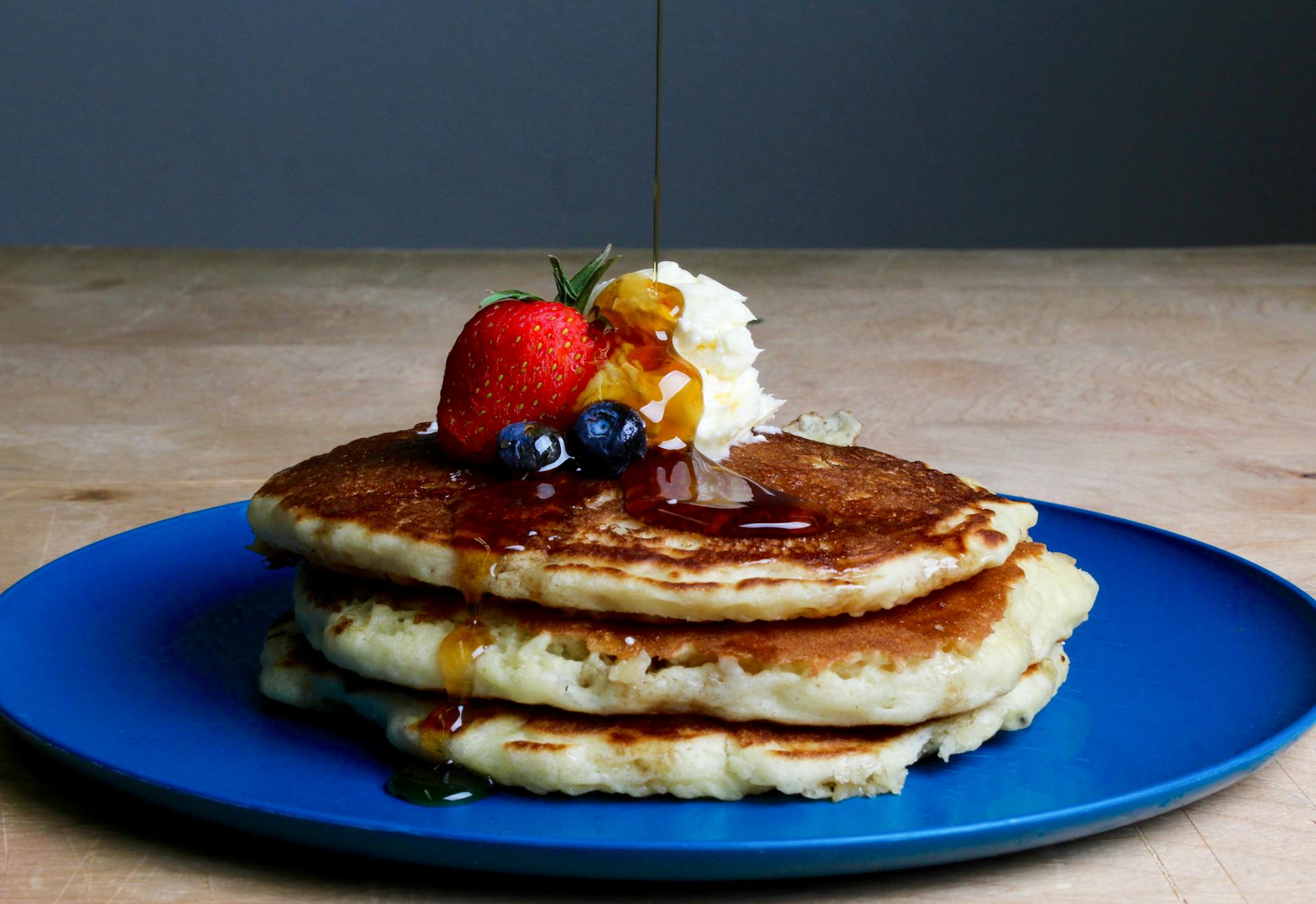
Pancakes with strawberry, blueberries, and maple syrup | Source: Pexels
“I did. I’m sorry. I know you didn’t want anyone to know. But I had to. She thought she was dreaming, Owen.”
He frowned, his brows furrowed. “She wasn’t mad?”
“No,” I said, smiling gently. “She cried. Then hugged me. She misses you so much.”
He didn’t say anything right away. Just stared at his shoes.
Then I added, “She wants to see you.”
He looked up, eyes wide. “Really?”
“Yes, she does. She misses you every single day.”
That evening, I walked him to Ruth’s house. She was already waiting on the porch, her hands trembling with anticipation.
“Owen?” she whispered when she saw him.
He froze. Then ran up the steps into her arms.
I don’t think I’ve ever seen a smile so pure, so full of relief and love, as the one on his face in that moment.
After that, things changed.
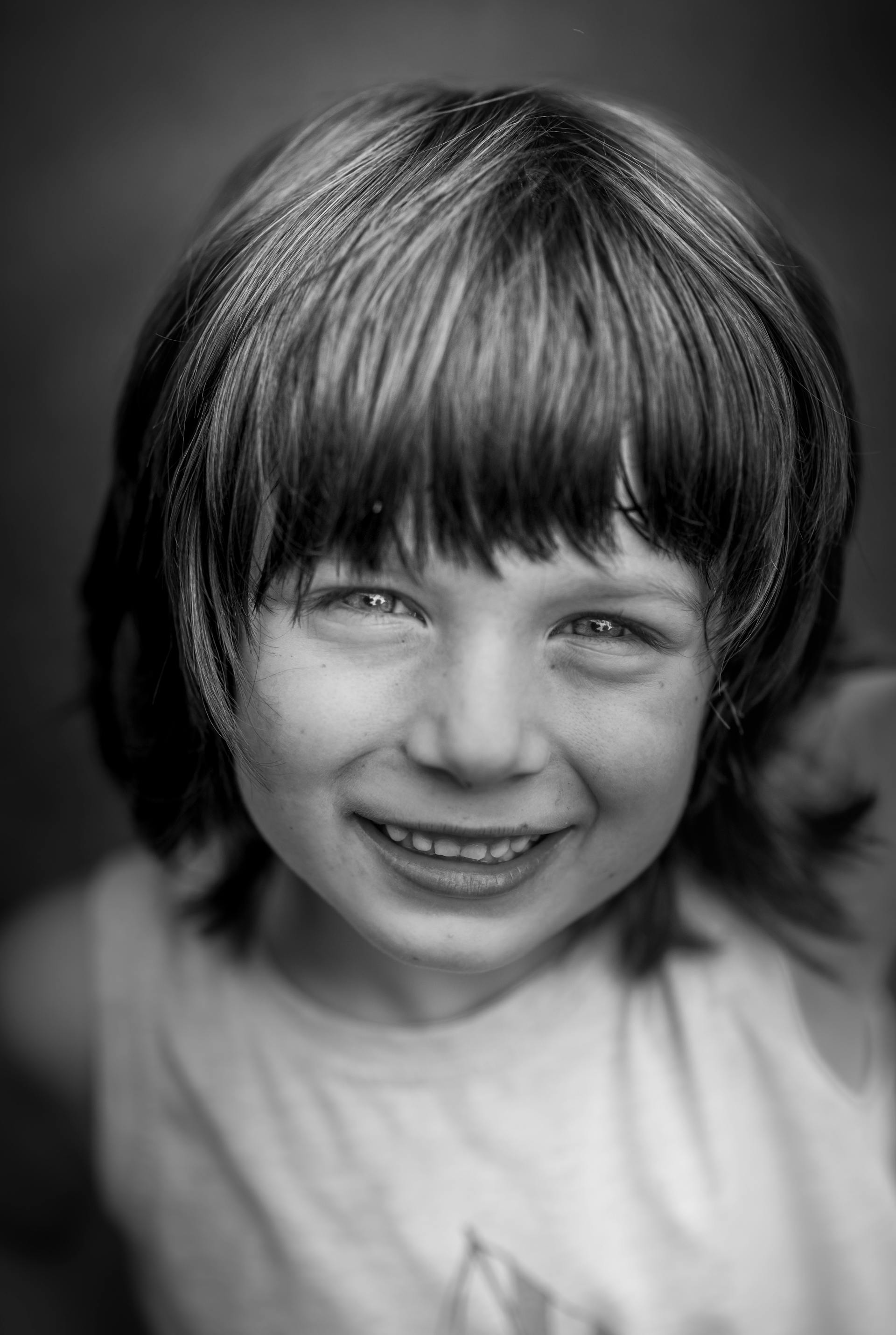
A grayscale photo of a young boy smiling | Source: Pexels
I started helping them with groceries, small repairs around the house, and doctor appointments for Ruth. It didn’t feel like charity. It felt like family. I didn’t even question it.
Sometimes, Owen would come by the diner after school. I gave him an apron with his name on it that read “Assistant Chef Owen,” and he helped wipe down tables and fold napkins.
One rainy afternoon, while he sipped hot chocolate at the counter, a woman in a gray blazer walked in. She looked official, with a clipboard in hand and eyes that scanned the place carefully.
“Are you Ms. Brooks?” she asked.
“Yes,” I said, instantly cautious. “Can I help you?”
“I’m with Child Protective Services,” she said, offering a calm smile. “I heard you’ve been involved with Owen and Ms. Keane.”
My heart jumped. I braced for the worst.
“Is there a problem?”
She shook her head.

A woman in a face mask looking at a document | Source: Pexels
“Not at all. In fact, because of your support, both financial and emotional, Ruth has been re-evaluated for shared guardianship. And since you’ve listed yourself as a sponsor, we’d like to ask if you would consider becoming his legal co-guardian.”
I stared at her, stunned. I could barely speak.
Later that evening, Ruth and I sat in her small kitchen, the adoption paperwork spread across the table.
She reached across and held my hand.
“Honey,” she said gently, her voice thick with emotion, “I’m not going to be around forever. You’re the only one who loves him like I do.”
I nodded, wiping away a tear. “I’d be honored.”
Two months later, Owen officially moved back in with Ruth, but he still spent most of his afternoons at the diner. We kept his apron on a hook by the kitchen door.

An apron hanging from a wall with an analog clock close to it | Source: Pexels
“Hey, Rissa,” he said one night while stacking chairs. “Can I call you something else?”
I looked at him, curious. “Like what?”
He hesitated, fidgeting with a salt shaker.
“Can I call you Mom? You don’t have to say yes. I just… I feel like you are.”
I couldn’t answer immediately. My throat was tight with emotion. I knelt, pulled him into a hug, and whispered, “You already do.”
*****
Three years passed in the blink of an eye.
Ruth passed peacefully in her sleep the following spring. She’d had a quiet dinner with us, watched “Wheel of Fortune,” and gone to bed smiling.

A close-up shot of an elderly woman’s hand | Source: Unsplash
Owen and I were with her until the very end.
When the adoption became official, I brought a framed photo of Ruth to court. Owen wore a dress shirt and blue sneakers. He squeezed my hand as the judge signed the papers.
“Grandma would be happy now,” he said softly.
And I knew she would be.
That night, I sat in my restaurant alone, looking at the flickering lights and the little apron still hanging on the hook.
I thought about Cole, the man who said I would never be a mother.
And I laughed through my tears.
Because life had proven him wrong in the most beautiful way.
I didn’t just save a boy.
He saved me, too.
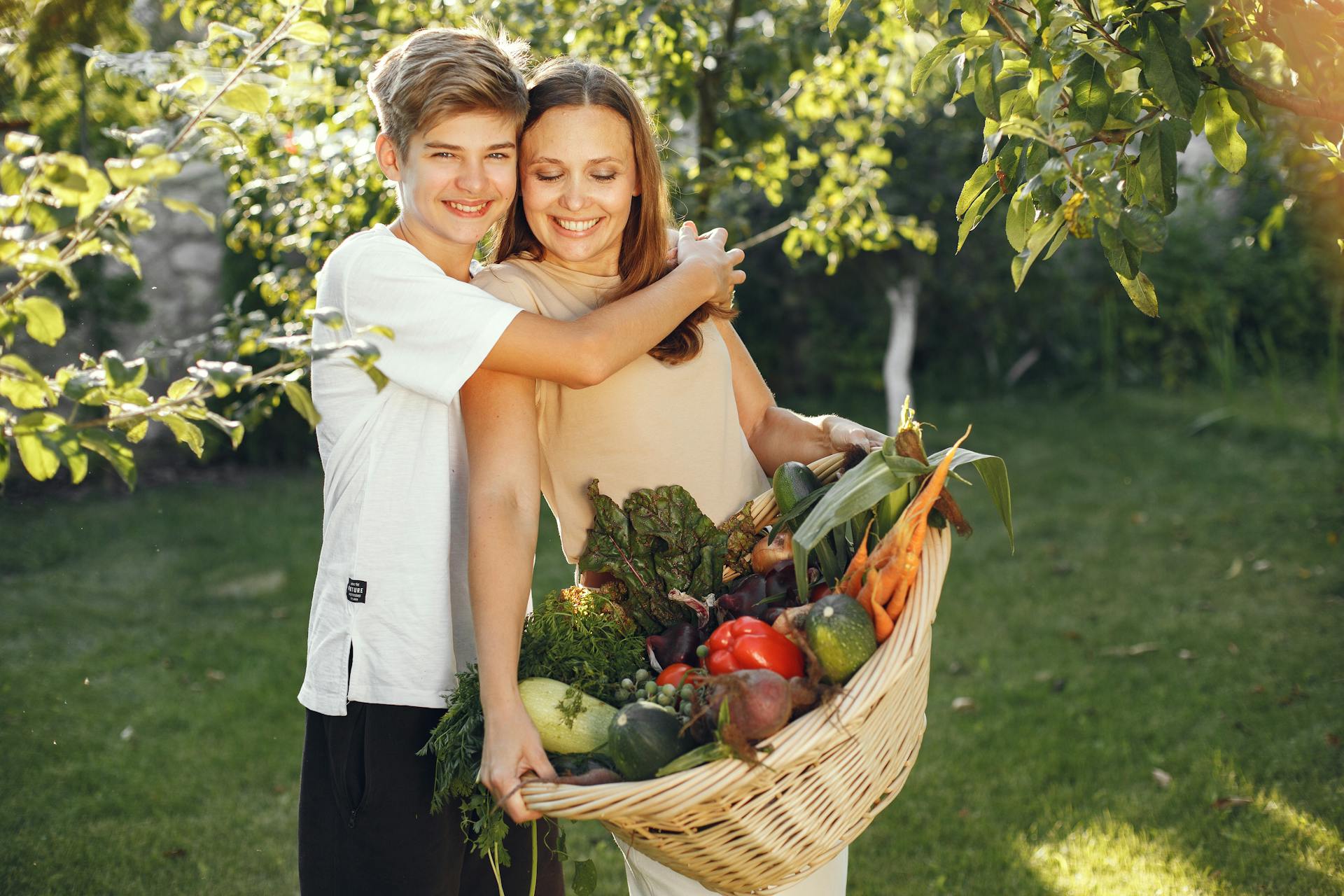
A boy hugging his mom in the garden | Source: Pexels
And sometimes, all we need is a little saving and some love to go with it, reminding us that family isn’t always about blood — it’s about who shows up and stays.
